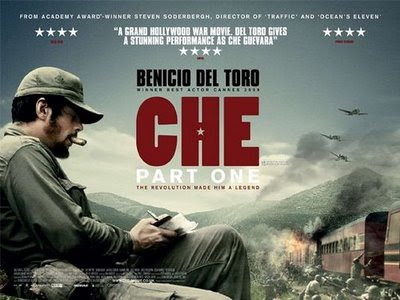

Steven Soderburgh's four and a half hour epic first shown in its entirety in Cannes of last year, was subsequently split into two films for major distribution. This could be viewed cynically as a marketing ploy for twice the sales, and also the daunting sense the average cinema goer would feel when contemplating the viewing of a film at such length. However the viewing experience of the first part separately and then both in their entirety (as was my experience), was that the first film acts successfully independent of the second.
Coming as it does from the period just before the foray into Cuba, some years after Walter Salles' 'Motorcycle Diaries', the film charts the major success of Guervara's Revolutionary campaigning. Much like that previous film, Soderburgh's aim was to truly deconstruct the revolutionary icon, to bring a much more human story that shows his flaws both physical and moral. From his constant asthma attacks to his execution of guerilla traitors, scenes are inter-cut between Che in amidst the lush greenery of the Cuban forests during the harsh campaigning, and black and white scenes from the post period in which we here arguements condemning his actions. Subsequently we see both Che the guerrilla activist as doctor and teacher to the sick and uneducated, and Che the politican with whit and cynicism towards his capitalist counterparts. What aids the pace of the film aside from the two narrative lines is the wealth of charismatic supporting characters, who often bring humour and relief to the often droll or pensive Che. The films outcome is never in doubt from the first, whether you know your modern history or not, so we are not being asked of the film to follow its narration but question each moment and decision taken on a human level. This is a humanist film as much as a political debate.
The second film however, I felt for many reasons was in stark contrast to the first in many ways and not all in a positive way. In many ways it is a more earnest film, it doesn't set out to entertain its audience, there are no light reliefs or charismatic characters, even Che is an elusive ponderous sage. This film is far more a character study than the first, to enlighten to the Humanity of Che, Che in his darkest hour when his revolution and ideals fail both militarily and socially in a propaganda sense. Far from the glory of the first part with its ideological parade against authoritarian oppression, here he comes up against democracy and fails. The greatest part of the failure shown in this film is the in-glory of it all. I am in many ways reminded of Werner Herzogs 'Aguirre Wrath of God', not because of the protagonists slide into madness and despair, but the way the landscape mirrors the characters psychological state, dry, barren, and without escape. In many ways Aguirre's disillusionment is matched by Che's but in a more sombre and less theatrical fashion.
Although it stands as a film in its own right, the two together are as one. Without having seen the first, there is no way you could fathom any reason for the constant continuation of their crusade. All the pace and motion for the fall is set up in the first act. For this reason the triumph of the first is balanced by the tragic consequences of the second.

